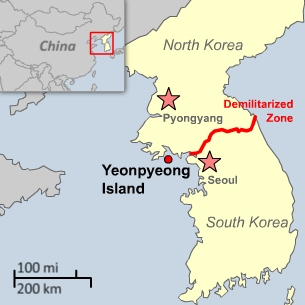




Nuclear-armed North Korea fired artillery shells into South Korea on
Tuesday, killing two marines and injuring civilians, and
setting off widespread alarm in one of the worst attacks since the
Korean War.
The attack drew worldwide condemnation, including
from U.N. Secretary-General Ban Ki Moon, and placed South Korea on high
military alert.
South Korean troops retaliated with cannon fire
and sent jet fighters to the area, close to a disputed maritime border
on the west of the divided Korean peninsula and the scene of deadly
clashes between the two rivals in the past.
Seoul warned North Korea of "enormous retaliation" if it took
more aggressive steps.
South Korean President Lee Myung-Bak's
government met in an underground war room in response to what it called
an atrocity against civilians.
Three civilians and 17 South Korean soldiers
were wounded in the attack on Yeonpyeong Island,
just 120 km (75 miles) west of Seoul.
News of the attack shook financial markets across the globe, already unsettled by Ireland's debt woes.
North
Korea's supreme command, however, accused South Korea of firing first
and vowed "merciless military attacks with no hesitation if the South
Korean enemy dares to invade our sea territory..."
South Korea was conducting military drills in the area at the time but said it had not been firing at the North.
Technically at war

Washington said it was too early to consider any military response
to the North Korean strike but said it was "firmly committed to the defense" of
South Korea.
"At this point it's premature to say that we're considering any action," Pentagon spokesman Colonel Dave Lapan told reporters.
President Barack Obama was awakened before dawn with the news and
the White House demanded Pyongyang respect an Armistice agreement that
ended the 1950-53 Korean war.
Coordinated response
Obama is to speak by telephone with President Lee, as U.S. and South Korean defense chiefs agreed to "coordinate" any response to the attack.
U.S. envoy on North Korea Stephen Bosworth, who was in Beijing, said
the United States and China agreed on the need for restraint, after he
discussed the incident with Chinese officials.
China—North Korea's sole major ally and source of economic aid—also
called for the resumption of stalled six-nation talks aimed at
dismantling Pyongyang's nuclear drive.
The North Korean assault
came amid tensions over Pyongyang's claim that it has a new uranium
enrichment facility and just six weeks after North Korean leader Kim
Jong Il unveiled his youngest son, Kim Jong Un, as his heir apparent.
Washington
had said it was studying the evidence a group of visiting American
scientists used to conclude the North was building the enrichment
facility, which presumably could be used to produce fuel for nuclear
weapons.
Inter-Korean talks shelved
Yeonpyeong lies just south of the border established by U.N. forces
after the war, but north of the sea border claimed by Pyongyang.
Inter-Korean
talks scheduled for Thursday, aimed at arranging further reunions of
families separated by the war, were shelved, Seoul's unification
ministry said.
Russian
Foreign Minister Sergei Lavrov warned of "colossal danger" from the new Korean
tensions.
"This could degenerate into military actions," he said.
Japanese Prime Minister Naoto Kan ordered his government to prepare for any eventuality.
Reported by Radio Free Asia's Korean Service with contributions from news agencies. Written by Parameswaran Ponnudurai.